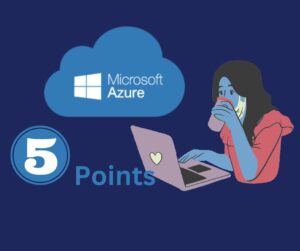Microsoft Azure offers numerous services, which is why its use cases are extremely diverse. In this article, we have discussed what is Microsoft Azure? What is Microsoft Azure used for? Its features and why to use it?
So, let’s deep dive into the article and find out about the various cases in which Microsoft Azure is used.
What is Microsoft Azure?
Before discussing Microsoft Azure’s use cases let’s first understand what is Microsoft Azure.
Microsoft Azure formerly Windows Azure, is Microsoft’s public cloud computing platform. It offers cloud services like computing, analytics, storage, and networking. Users can pick from these services to develop and scale their new or existing applications.
Azure charges on a pay-as-you-go basis, which means that Microsoft charges subscribers each month for the specific resources they used. You can calculate your cost before purchasing Azure services. Visit Azure Pricing Calculator to find out your pricing.
What is the type of Cloud is Microsoft Azure ?
Microsoft Azure is a public cloud computing platform. Microsoft owns and manages all hardware, software, and other supporting infrastructure as a public cloud provider. You can access these services and manage your account using a web browser.
What are the 5 features of Microsoft Azure ?
Below are some of the features of Microsoft azure
- Infrastructure as a Service (IaaS)
- Strong Support in Analytics
- Enhance Existing IT Support
- Unique Storage System
- Enhanced Scalability
- Enhanced Flexibility

What is Microsoft Azure used for?
Now that you know about Azure and its features, you might be interested in knowing what Azure is used for.
- Compute: You can deploy and manage VMs, containers, and batch jobs, as well as support remote application access.
- Mobile: You can build cloud applications for mobile devices.
- Web: You can develop and deploy web applications in the cloud.
- Storage: You can use Azure for storage also. It provides scalable cloud storage for structured and unstructured data.
- Analytics: You can use Azure for distributed analytics and storage, real-time analytics, big data analytics, data lakes, machine learning, business intelligence, the internet of things, data streams, and data warehousing.
- Networking: You can use Azure for virtual networks, dedicated connection and gateways, traffic management and diagnostics, load balancing, DNS hosting, and network protection against distributed denial-of-service (DDoS) attacks.
- Media and Content Delivery Network (CDN): You can use Azure for on-demand streaming, digital rights protection, encoding and media playback, and indexing.
- Integration: You can use Azure for server backup, site recovery, and connecting private and public clouds.
- Identity: Azure helps in protecting encryption keys and other sensitive information in the cloud.
- Internet of things: With Azu you can capture, monitor, and analyze IoT data from sensors, and other devices.
- DevOps: With Azure, you can facilitate software development processes. You can do application diagnostics, DevOps tool integrations, and tests labs for build tests and experimentation.
- Development: With the Azure application developers can share code, test applications, and track potential issues.
- Security: Azure can also provide capabilities to identify and respond to cloud security threats, as well as manage encryption keys and other sensitive assets.
- Artificial Intelligence and Machine Learning: A developer can use Azure to infuse artificial intelligence, machine learning, and cognitive computing capabilities into applications and data sets.
- Containers: Azure also helps enterprises create, register, orchestrate and manage the huge volume of containers, using common platforms such as Docker and Kubernetes.
- Databases: Azure offers Databases as a Service (DBaaS) for SQL and NoSQL, as well as other database instances. Azure helps in Azure SQL Data Warehouse Support, caching, and hybrid database integration and migration. Azure SQL is a relational database so you can use SQL functionality without the need for deploying a SQL server.
- Migration: With the help of Azure an organization can estimate workload migration costs and perform the actual migration of workloads from local data centers to the Azure cloud.
- Management and Governance: Azure provides a range of backup, recovery, compliance, automation, scheduling, and monitoring tools that can help a cloud administrator manage an Azure deployment.
- Mixed Reality: Azure can also help developers to create content for the Windows Mixed Reality environment.
- Blockchain: Azure can also help you to join a blockchain consortium or to create your own.
- Intune: An organization can use Microsoft Intune of Azure to enroll user devices, thereby making it possible to push security policies and mobile apps to those devices. Intune can also help in tracking which apps are being used. An organization can also use the remote wipe feature of Intune if they want to securely remove the organization’s data from devices without removing a user’s mobile app.
Why Microsoft Azure
Now that we have discussed various use cases of Azure let’s find out some points why you should choose Azure over its competitors?
- Regional Availability
- Cost Savings
- Better Platform as a Service Option
- Compatible with .NET Framework
- Consistency in a Hybrid Environment
- Compliance and Security
If you want more clarity about the above points you can refer to our article on Azure vs AWS.
What type of vendor is Microsoft Azure
As we discussed Azure is a Public Cloud Vendor that offers over 200 services that are available over the internet.
Conclusion
Azure is undoubtedly the fastest growing cloud computing platform with its 200+ services and numerous benefits. You can visit our page Microsoft Azure Cloud for more info about Microsoft Azure.
If you are interested in finding out more about Azure, E-Yantra is always available to help you out. Contact us today at 086381 45852 or email ravi@eyantra.net.in


No comment